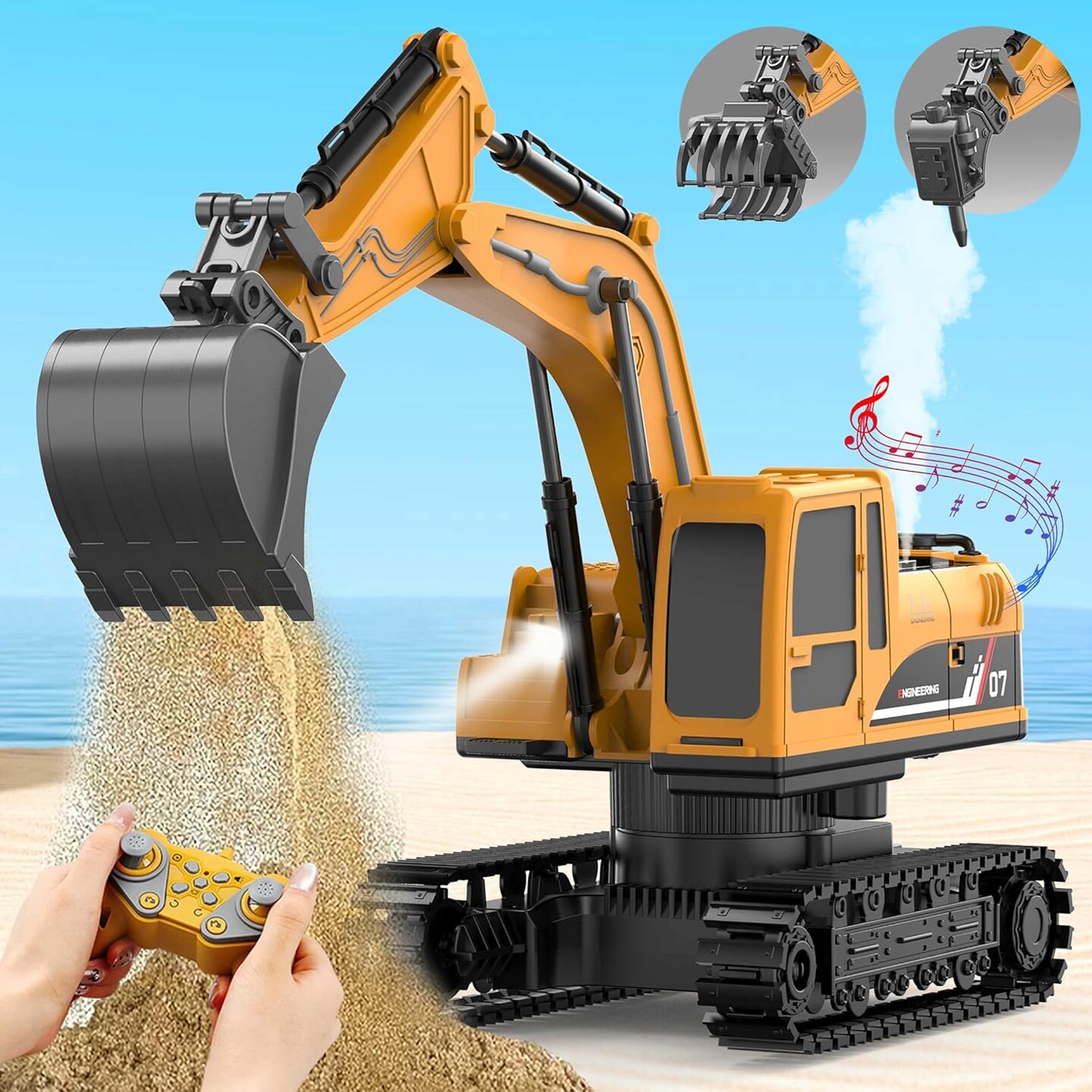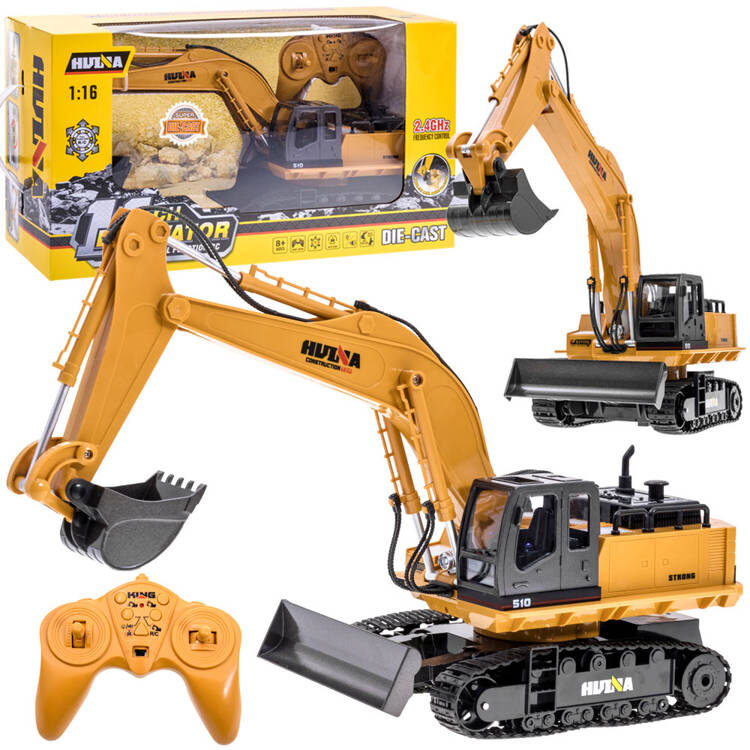What Makes the rc excavator Stand Out Among Other Construction Machines
Wiki Article
Discover the Relevance of Excavator in Modern Building Projects
Excavators are necessary tools in contemporary building tasks. Their adaptability allows them to perform a broad range of tasks, from excavating and grading to demolition and website prep work. Advanced functions, such as hydraulic accessories and GPS, enhance their capabilities and effectiveness on task websites. As the industry evolves, the significance of excavators grows much more. Comprehending their duty can reveal insights right into the future of construction methods. What exists in advance for these makers?The Flexibility of Excavators in Numerous Projects
Although excavators are commonly related to large-scale building tasks, their convenience enables them to be utilized in a vast array of applications, from property landscape design to energy maintenance. In urban setups, excavators can browse limited spaces to dig structures for homes or mount drainage systems. Their capacity to carry out delicate jobs makes them optimal for landscaping tasks, where they can dig deep into for ponds or plant trees. Furthermore, excavators play a necessary role in utility maintenance, efficiently excavating trenches for pipelines or wires without interrupting bordering areas. In farming applications, they assist in land cleaning and dirt preparation. In addition, their flexibility allows them to be outfitted with numerous accessories, improving their performance across different tasks. This diverse nature of excavators not only simplifies various building processes yet likewise shows their indispensable duty in contemporary framework growth and maintenance.Trick Functions and Kinds Of Excavators
The discussion on essential functions and kinds of excavators highlights the necessary features that make these makers important in building. Various excavator types, each created for specific jobs, demonstrate their adaptability and efficiency throughout different applications. rc excavator. Comprehending these categories and features is crucial for maximizing their use in contemporary building tasksExcavator Enters Overview
Excavators play a crucial function in contemporary building and construction, using versatility and effectiveness across different jobs. These hefty machinery units can be found in numerous types, each tailored for particular applications. One of the most typical kinds consist of crawler excavators, understood for their stability on uneven terrain, and rolled excavators, which provide higher mobility on paved surfaces. Tiny excavators are preferred for small tasks and limited areas, while long-reach excavators are created for deep excavating. Additionally, there are specific excavators, such as hydraulic excavators, which improve power and accuracy. Each kind features distinct capacities, making them necessary for jobs ranging from digging and grading to demolition and material handling. Comprehending these variations permits building and construction specialists to pick the appropriate excavator for their task requires.Secret Includes Explained
Comprehending the essential features of excavators boosts their effective application in building and construction tasks. Excavators are identified by their effective hydraulic systems, which give the essential pressure for digging, lifting, and moving materials. Their articulated arms permit for a wide variety of activity, assisting in accurate procedures in constrained areas. In addition, the range of accessories, such as containers, grapples, and augers, expands their adaptability to fulfill different project needs. The dimension and weight of excavators also add to their security and maneuverability on various terrains. Developments in modern technology have actually led to the combination of GPS and automation, boosting precision and effectiveness in excavation jobs. These attributes collectively place excavators as vital devices in modern-day building.Applications in Building
Changing construction websites, excavators play a pivotal function throughout various applications, varying from domestic structure jobs to large-scale infrastructure advancements. These functional devices are furnished for jobs such as digging foundations, trenching for energies, and website grading. Different sorts of excavators, consisting of spider, rolled, and mini excavators, offer specific advantages tailored to the job needs. Crawler excavators excel in rough surfaces, while rolled excavators supply movement on paved surface areas. Miniature excavators are optimal for restricted areas, making them preferred in urban setups. The efficiency and power of excavators considerably accelerate construction processes, making sure prompt job completion. Their versatility additionally improves their value, enabling building teams to tackle a diverse array of challenges efficiently.Enhancing Effectiveness and Efficiency on Job Sites
Making best use of performance and performance on work sites is an essential goal in modern-day building and construction. Excavators play a crucial function in accomplishing this goal by improving numerous jobs. Their capacity to carry out numerous functions-- such as training, grading, and digging-- lowers the demand for added tools, thereby saving time and resources.Moreover, excavators boost process by enabling faster completion of tasks. With sophisticated functions like hydraulic accessories and GPS modern technology, they can carry out accurate procedures that reduce mistakes and remodel. This accuracy not only enhances the top quality of job yet additionally optimizes product usage, adding to set you back savings.The flexibility of excavators allows them to adjust to different website conditions, making sure that projects proceed efficiently no matter difficulties. By incorporating excavators into construction procedures, teams can substantially enhance their overall performance, causing timely task conclusion and increased earnings.Safety And Security Benefits of Using Excavators
Excavators considerably improve security on building and construction sites with enhanced operator visibility and lowered manual work threats. By providing drivers with a clear view of their surroundings, excavators aid to stop injuries and crashes. In addition, the machinery minimizes the requirement for employees to take part in harmful hands-on jobs, even more advertising a more secure workplace.Improved Driver Visibility
Construction sites can be chaotic and filled with possible dangers, boosted driver exposure plays a crucial role in guaranteeing safety and security when making use of excavators. Modern excavators are developed with huge, unhampered home windows and tactically positioned mirrors, enabling operators to maintain a clear view of their surroundings (rc excavator). This boosted presence is essential for detecting pedestrians, other machinery, and various barriers, significantly lowering the danger of accidents. Furthermore, several excavators incorporate innovative technology, such as sensing units and electronic cameras, to provide drivers with extra point of views, further improving awareness. The capacity to see more plainly not only help in reliable operation however likewise promotes a safer workplace, making it less complicated for drivers to browse intricate building websites without endangering safety standardsReduced Manual Work Risks
When hands-on labor is reduced with using excavators, various safety benefits emerge, markedly boosting the health of building employees. Excavators reduce the physical stress connected that site with hefty training and repeated tasks, successfully reducing the risk of bone and joint injuries. By automating procedures such as excavating, grading, and relocating materials, they allow workers to preserve a safer distance from potential hazards. Additionally, excavators are outfitted with advanced safety and security functions, such as rollover protection systems and improved operator ergonomics, which even more safeguard workers on website. The outcome is a substantial decrease in office accidents and injuries, resulting in enhanced efficiency and spirits amongst building teams. Ultimately, the adoption of excavators adds to a more secure and click to read extra reliable construction setting.Excavators in Earthmoving and Website Prep Work
In modern-day building, a substantial part of earthmoving and website preparation tasks relies upon the effectiveness and versatility of excavators. These devices are designed to manage various soil kinds and surface, making them crucial for rating, excavating, and trenching activities. Their hydraulic arms can be geared up with various add-ons, such as pails and augers, enabling operators to tailor their approach based upon certain job requirements.Excavators succeed at moving huge quantities of earth rapidly and effectively, which increases the general building timeline. They can navigate tight spaces and testing websites where conventional devices may have a hard time, enhancing efficiency. Furthermore, the accuracy of excavators guarantees that website preparation sticks to rigorous specifications, decreasing the danger of mistakes that can lead to costly rework.The Function of Excavators in Demolition Tasks
Excavators play a vital duty in demolition jobs, as they have the power and agility required to dismantle structures effectively. Geared up with various accessories such as hydraulic breakers, shears, and grapples, these machines can adapt to different demolition demands, whether for small structures or here are the findings large industrial websites. Their adaptability allows drivers to deal with complex tasks while preserving safety and security and precision.In addition to their demolition capabilities, excavators facilitate particles removal, making sure that job sites stay well organized and risk-free. By damaging down frameworks into manageable pieces, they enable structured clearing up and recycling of products, aligning with modern sustainability efforts.Moreover, excavators can access limited rooms and navigate uneven terrain, making them indispensable in city demolition projects. Generally, their durable style and multifunctionality make excavators an important property in the demolition stage of building, contributing considerably to job timelines and efficiency.

Future Fads in Excavator Innovation and Use
As the construction industry develops, innovations in excavator innovation are poised to transform their usage and effectiveness significantly. One significant pattern is the combination of automation and artificial intelligence, permitting excavators to operate with marginal human treatment. This shift will boost accuracy in tasks such as grading and trenching, minimizing human mistake and raising productivity.Additionally, the rise of electric and hybrid excavators is forming a much more sustainable construction atmosphere, reducing carbon exhausts and fuel costs. Boosted telematics systems are additionally arising, allowing real-time monitoring of machine efficiency and maintenance needs, which can lead to better operational effectiveness and longer equipment lifespan.Moreover, innovations in accessory modern technology are broadening the convenience of excavators, enabling them to do a wider range of tasks. The mix of these trends shows a future where excavators are smarter, greener, and extra versatile, inevitably improving construction job dynamics.
Often Asked Concerns
Just How Do Excavators Compare to Other Building And Construction Machinery?
Excavators, characterized by their adaptability and power, master excavating and earthmoving compared to various other equipment. Their capability to carry out numerous tasks, consisting of lifting and demolition, makes them vital in building and construction projects, boosting overall efficiency.
What Is the Ordinary Life Expectancy of an Excavator?
The ordinary lifespan of an excavator usually varies from 7,000 to 10,000 operating hours, depending upon upkeep, usage problems, and model. Appropriate treatment can expand this life-span, making sure peak efficiency throughout its functional years.Just How Are Excavators Preserved for Ideal Performance?
Excavators need regular upkeep for peak efficiency, including routine assessments, fluid checks, filter replacements, and timely repairs. Implementing a precautionary upkeep timetable aids lengthen their life expectancy and guarantees effective procedure in various building and construction settings.What Are the Costs Related To Buying an excavator vs. renting?
The prices related to renting out versus acquiring an excavator differ considerably. Leasing offers lower upfront expenses yet can gather in time, while acquiring requires a considerable preliminary financial investment, yet provides long-lasting savings and property possession benefits.What Training Is Required to Operate an Excavator?
Running an excavator needs specialized training, typically consisting of safety and security protocols, device operation strategies, and environmental understanding. Certification programs often mandate functional experience, allowing operators to take care of numerous tasks efficiently while making sure conformity with market guidelines. The most usual types consist of spider excavators, recognized for their security on irregular terrain, and wheeled excavators, which supply higher wheelchair on paved surface areas. Small excavators are preferred for small-scale tasks and tight spaces, while long-reach excavators are made for deep excavating. Additionally, there are customized excavators, such as hydraulic excavators, which boost power and precision. Various types of excavators, consisting of crawler, rolled, and mini excavators, give details advantages customized to the project demands. Crawler excavators succeed in harsh terrains, while wheeled excavators supply flexibility on smooth surface areas.Report this wiki page